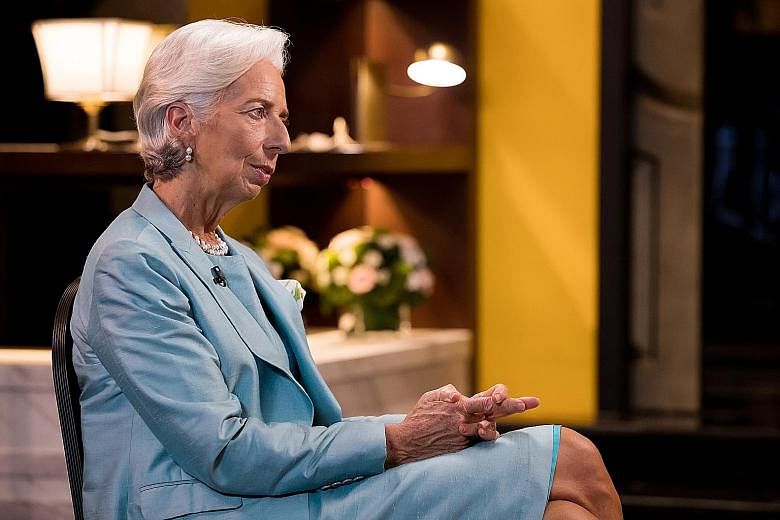The global economy is enjoying a strong, broad-based recovery and will grow even faster next year, but some risks remain, said International Monetary Fund (IMF) managing director Christine Lagarde.
Ms Lagarde noted in an exclusive interview during a two-day visit to Singapore this week that about 75 per cent of the world economy is now growing, and not only from "the usual suspects of domestic consumption and trade, but also investment, which had been lagging for many years".
The IMF recently raised its forecasts for global growth to 3.6 per cent this year and 3.7 per cent next year, compared with 3.2 per cent last year.
It noted that "broad-based upward revisions in the euro area, Japan, emerging Asia, emerging Europe and Russia more than offset downward revisions for the United States and the United Kingdom".
However, Ms Lagarde added that there remain concerns about the 40-odd countries that are not participating in the global recovery, most of them in sub-Saharan Africa.
"We also need to be concerned about growth potential, which is certainly lower than we would like to see and that has to do with productivity issues - productivity is still quite low," she said.
She also flagged other concerns, including high inequalities as well as demographic, geopolitical and financial risks.
The IMF boss, a former finance minister of France, also touched on a host of other issues in a wide-ranging interview, including the possibly disruptive impact of artificial intelligence (AI) and robotics, globalisation and changes in the fund's agenda since she took over in 2011.
She called on governments to step up investments in education and training to prepare workforces for possible disruption from new technologies: "So, we better be prepared and be able to adjust... and take changes as they come."
Partly in response to the pressures on jobs from automation, the IMF has started to study the concept of universal basic income (UBI), where governments unconditionally transfer an equal amount of income to all citizens.
Ms Lagarde said: "We have decided to study the conditions under which it is beneficial and positive, as a substitute to other payments of benefits that are poorly targeted and inefficient.
"UBI can be a more efficient way of helping people out."
But she added that the IMF was "not advocating the UBI as a panacea... We are only studying it to see if it can work better in lieu of existing inefficient systems".
Ms Lagarde also reflected on the popular backlash against globalisation, noting first that expanding global trade has lifted hundreds of millions of people out of poverty, made goods cheaper and improved productivity.
But it has also negatively affected a range of people and economic sectors because of changes in supply chains and the transfer of activities to other countries. "Those negative impacts have been underestimated. The financial crisis revealed that not everybody was doing well," she said.
She pointed out that many of the transformations have been driven by new technologies, not by "globalisation induced by foreigners, as is often portrayed". But whatever the cause, "we just have to make sure that the globalisation process is efficient and is also inclusive".
As regards her own organisation, Ms Lagarde said the IMF, which some commentators say stands for "it's mostly fiscal", is now also concerned with a range of issues, including inequality, the role of women in the economy, climate change, financial technologies, money laundering and corruption.
"All of that is not entirely new, but it is definitely more on the map than when I joined as managing director in 2011," she said.
"I hope it continues to be that way because all those issues... have an impact on how societies develop, how economies can be strengthened and how stability can be provided to people."
Ms Lagarde visited the Fintech Festival while in Singapore, and met government officials, including Deputy Prime Minister and Coordinating Minister for Economic and Social Policies Tharman Shanmugaratnam and Monetary Authority of Singapore managing director Ravi Menon.

